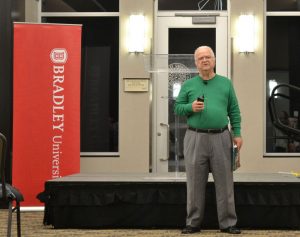
Photos by Cenn Hall
From the fields of the South, to a bus on Montgomery and even to present day – a human design flaw looms over mankind’s ability to coexist.
David Billings, historian and author of “Deep Denial: The Persistence of White Supremacy,” visited Bradley on Monday to deliver a speech in Hayden-Clark Alumni Center on his experience of racism from the perspective of a white southerner.
Well aware of the contradiction of this idea, Billings said he builds his views from that very thought, using his experiences to organize against racism.
According to Billings, he incorporates an intimate knowledge of history into his own experience as a working class white man from Arkansas and Mississippi. What results is an autobiographical journey of introspection on where prejudice – namely, white supremacy – derives from.
“I believe that the anger is based on the internalization of a lie,” Billings said during his speech. “The lie that was made back at the start of this nation … a social contract: each group of white people will live better than the one preceding him.”
But the lineage of power passed on by status of race does not have to occur, according to Billings.
“We have a legacy, and it can be passed down to our progeny,” Billings said. “And they’re basically saying, ‘I don’t think you can keep that promise any longer.’ We are suffering. But I say, ‘If you’re suffering, why don’t you join up with others who are suffering, and we can turn this thing around.’ But no – we keep opting for the racial advantage.”
During his speech, Billings discussed the ingrained conceptions of prejudice within our brains. He even demonstrated this in real time by having the audience finish popular derogatory statements, such as, “A woman’s place is in the …” and others, segueing into racially charged.
For Kristen Mueller, a sophomore marketing major, the speech made her uncomfortable, but it also offered the opportunity to mull through her thoughts on the message Billings was sending.
“It was strange,” Mueller said. “A lot of what he said points to these awful problems, and how they’re kind of stored in our brains without us even knowing it. And that’s half the battle right there … self-awareness.”
Nancy Amos, assistant professor of social work, helped organize the event and said Billings’ message was the perfect vehicle for her and students majoring in social work.
“I think that it’s important that we listen to multiple perspectives on issues that are important to us,” Amos said. “I think that it’s important for social work students particularly to have an understanding of what gives rise to some of our cultural beliefs. And I think … It’s important to have a dialogue.”
Billings currently serves as a trainer and organizer with The People’s Institute for Survival and Beyond, as well as New York University and other organizations to combat racism.




